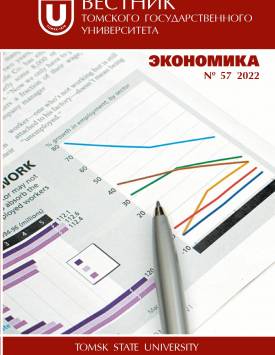Trends in employment development in the modern economy
In the modern economy, an unprecedented rapid change in the sphere of work is taking place. The transformation of forms of employment and its impact on the labor market and social and labor relations have manifested themselves almost on a global scale. The article raises questions and poses problems related to trends in the development of new forms of employment, in particular, under the influence of the development of information and communications and digital technologies. The authors’ interpretation of the signs of modern forms of employment is proposed: the degree of documenting the employer-employee relationship; compliance with the classical requirements imposed by employers for working hours and contract terms; remoteness from the company’s head office of the employee’s workplace; conditions for the use of information and communications and digital technologies. This made it possible to distinguish such classification groups of employment as formal and informal, standard and non-standard, remote and stationary. To analyze the current state of issues related to the development of new forms of employment, data from the Federal State Statistics Service and the All-Russian Center for the Study of Public Opinion were used. The authors used the classical method of statistical analysis, which allows answering the questions posed. The article shows the influence of new non-standard forms of employment on the dynamics of the unemployment rate in Russia and on the dynamics of the number of vacancies over the past 20 years reported by Russian enterprises and organizations to the state employment service. The development of the platform economy is changing the nature of work, creating new forms of employment, and increasing the number of jobs. However, within the framework of platform employment, new problems arise, generated by the inability to meet the challenges of modern legislation, the uncertainty of the location of the employer and the employee, the lack of control over the provision of minimum wages, the health and safety of employees. The authors also analyzed the distribution of federal districts and regions of the Russian Federation by the number of part-time employees on the initiative of the employer for 2017. The largest number of employees who worked part-time at the initiative of the employer was revealed in the Volga Federal District. An overview of the gender and age characteristics of a sociological survey of 1,600 Russians aged 18 and over, conducted by the All-Russian Center for the Study of Public Opinion, on the advantages and disadvantages of remote work is presented. The new form of employment that has arisen is ambiguously evaluated and accepted by working Russians, but a positive beginning prevails. The relevant conclusions are drawn. The problems and further directions of labor market research, ensuring employment and decent wages, observance of workers’ rights and guarantees are outlined. Contribution of the authors: the authors contributed equally to this article. The authors declare no conflicts of interests.
Keywords
labor market, standard and non-standard forms of employment, remote work, unemploymentAuthors
| Name | Organization | |
| Dymova Irina A. | T.F. Gorbachev Kuzbass State Technical University | i-dymova@mail.ru |
| Nekhoda Evgenia V. | Tomsk State University | sheyna@sibmail.com |
References

Trends in employment development in the modern economy | Vestnik Tomskogo gosudarstvennogo universiteta. Ekonomika – Tomsk State University Journal of Economics. 2022. № 57. DOI: 10.17223/19988648/57/7
